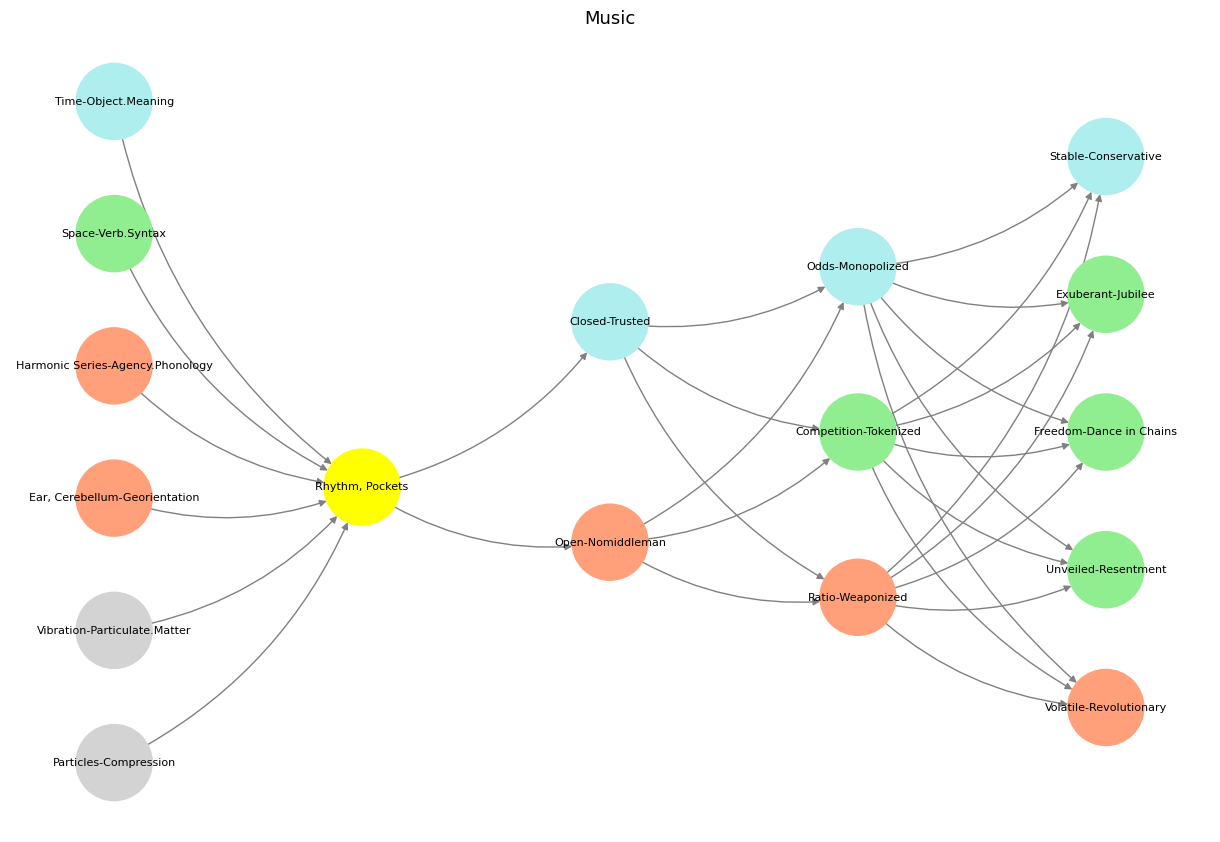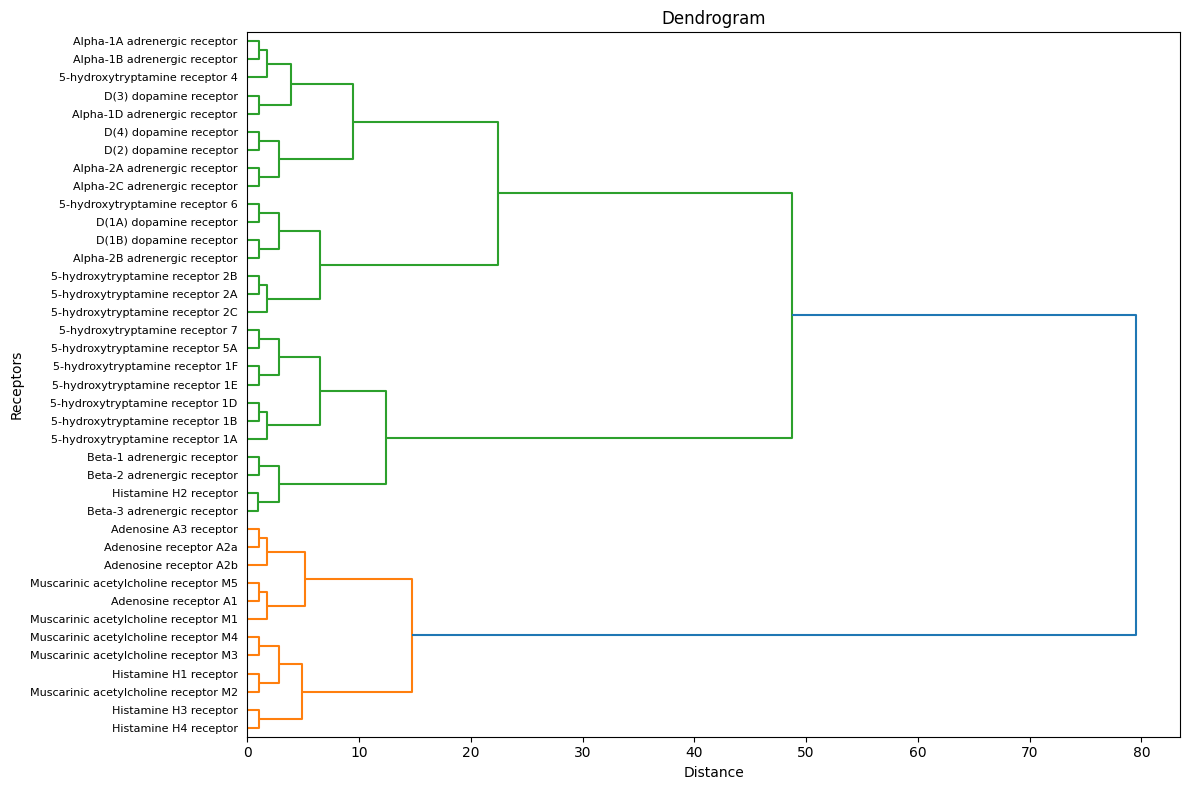Prometheus#

Fig. 11 Competition (Generativity) & Feedback (Exertion). The massive combinatorial search space and optimized emergent behavioral from “games” among the gods, animals, and machines are the way evolution has worked from the beginning of time. Peterson believes reinforcement learning through human feedback (RLHF- a post-training twitch) removes this evolutionary imperative.#
Show code cell source
import numpy as np
import matplotlib.pyplot as plt
import networkx as nx
# Define the neural network fractal
def define_layers():
return {
'World': ['Particles-Compression', 'Vibration-Particulate.Matter', 'Ear, Cerebellum-Georientation', 'Harmonic Series-Agency.Phonology', 'Space-Verb.Syntax', 'Time-Object.Meaning', ], # Resources
'Perception': ['Rhythm, Pockets'], # Needs
'Agency': ['Open-Nomiddleman', 'Closed-Trusted'], # Costs
'Generative': ['Ratio-Weaponized', 'Competition-Tokenized', 'Odds-Monopolized'], # Means
'Physical': ['Volatile-Revolutionary', 'Unveiled-Resentment', 'Freedom-Dance in Chains', 'Exuberant-Jubilee', 'Stable-Conservative'] # Ends
}
# Assign colors to nodes
def assign_colors():
color_map = {
'yellow': ['Rhythm, Pockets'],
'paleturquoise': ['Time-Object.Meaning', 'Closed-Trusted', 'Odds-Monopolized', 'Stable-Conservative'],
'lightgreen': ['Space-Verb.Syntax', 'Competition-Tokenized', 'Exuberant-Jubilee', 'Freedom-Dance in Chains', 'Unveiled-Resentment'],
'lightsalmon': [
'Ear, Cerebellum-Georientation', 'Harmonic Series-Agency.Phonology', 'Open-Nomiddleman',
'Ratio-Weaponized', 'Volatile-Revolutionary'
],
}
return {node: color for color, nodes in color_map.items() for node in nodes}
# Calculate positions for nodes
def calculate_positions(layer, x_offset):
y_positions = np.linspace(-len(layer) / 2, len(layer) / 2, len(layer))
return [(x_offset, y) for y in y_positions]
# Create and visualize the neural network graph
def visualize_nn():
layers = define_layers()
colors = assign_colors()
G = nx.DiGraph()
pos = {}
node_colors = []
# Add nodes and assign positions
for i, (layer_name, nodes) in enumerate(layers.items()):
positions = calculate_positions(nodes, x_offset=i * 2)
for node, position in zip(nodes, positions):
G.add_node(node, layer=layer_name)
pos[node] = position
node_colors.append(colors.get(node, 'lightgray')) # Default color fallback
# Add edges (automated for consecutive layers)
layer_names = list(layers.keys())
for i in range(len(layer_names) - 1):
source_layer, target_layer = layer_names[i], layer_names[i + 1]
for source in layers[source_layer]:
for target in layers[target_layer]:
G.add_edge(source, target)
# Draw the graph
plt.figure(figsize=(12, 8))
nx.draw(
G, pos, with_labels=True, node_color=node_colors, edge_color='gray',
node_size=3000, font_size=8, connectionstyle="arc3,rad=0.2"
)
plt.title("Music", fontsize=13)
plt.show()
# Run the visualization
visualize_nn()


Fig. 12 Nostalgia & Romanticism. When monumental ends (victory), antiquarian means (war), and critical justification (bloodshed) were all compressed into one figure-head: hero#
Show code cell source
import matplotlib.pyplot as plt
from scipy.cluster.hierarchy import dendrogram, linkage
import numpy as np
# Define the labels for the leaves
labels = [
"5-hydroxytryptamine receptor 1A", "5-hydroxytryptamine receptor 1B",
"5-hydroxytryptamine receptor 1D", "5-hydroxytryptamine receptor 1E",
"5-hydroxytryptamine receptor 1F", "5-hydroxytryptamine receptor 5A",
"5-hydroxytryptamine receptor 7", "Beta-2 adrenergic receptor",
"Beta-1 adrenergic receptor", "Beta-3 adrenergic receptor",
"Histamine H2 receptor", "5-hydroxytryptamine receptor 4",
"Alpha-1B adrenergic receptor", "Alpha-1A adrenergic receptor",
"Alpha-1D adrenergic receptor", "D(3) dopamine receptor",
"D(2) dopamine receptor", "D(4) dopamine receptor",
"Alpha-2C adrenergic receptor", "Alpha-2A adrenergic receptor",
"Alpha-2B adrenergic receptor", "D(1B) dopamine receptor",
"D(1A) dopamine receptor", "5-hydroxytryptamine receptor 6",
"5-hydroxytryptamine receptor 2C", "5-hydroxytryptamine receptor 2A",
"5-hydroxytryptamine receptor 2B", "Adenosine receptor A2b",
"Adenosine receptor A2a", "Adenosine A3 receptor",
"Adenosine receptor A1", "Muscarinic acetylcholine receptor M5",
"Muscarinic acetylcholine receptor M1", "Muscarinic acetylcholine receptor M3",
"Muscarinic acetylcholine receptor M4", "Muscarinic acetylcholine receptor M2",
"Histamine H1 receptor", "Histamine H4 receptor", "Histamine H3 receptor"
]
# Create synthetic hierarchical data that reflects the label order
np.random.seed(42) # For reproducibility
data = np.arange(len(labels)).reshape(-1, 1) + np.random.rand(len(labels), 1) * 0.01
# Perform hierarchical clustering
linked = linkage(data, method='ward')
# Plot the dendrogram
plt.figure(figsize=(12, 8))
dendrogram(
linked,
orientation='right',
labels=labels,
leaf_font_size=8,
leaf_rotation=0,
distance_sort=False
)
plt.title("Dendrogram")
plt.xlabel("Distance")
plt.ylabel("Receptors")
plt.tight_layout()
plt.show()


